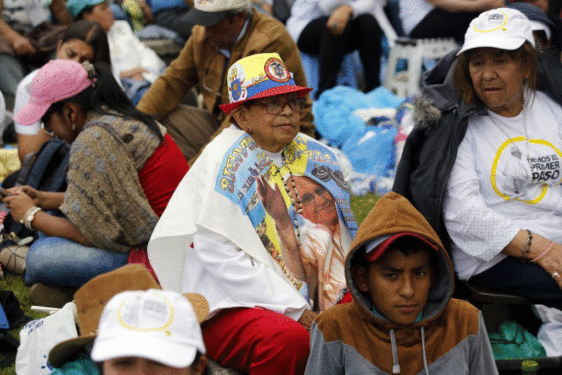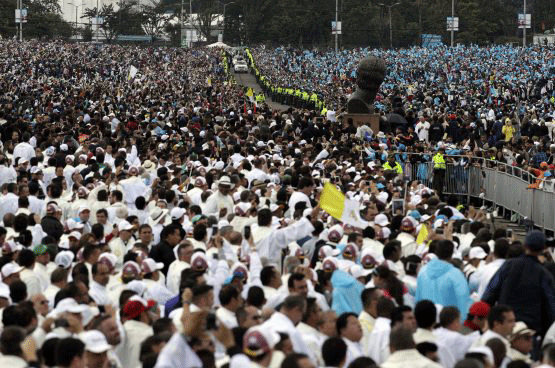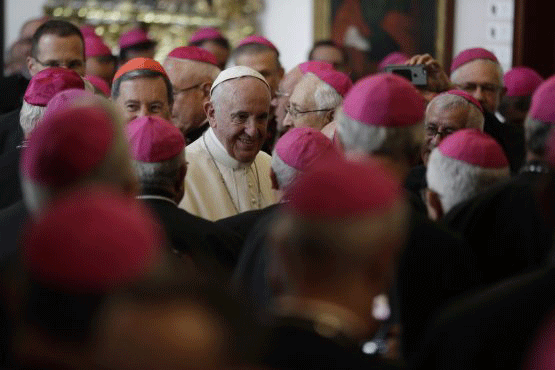By Inés San Martín
Special to The Tablet

BOGOTÁ, Colombia — Human life must be protected at all its stages, but especially when it’s most fragile, Pope Francis said on Thursday at an open-air Mass that gathered a crowd estimated at 1.1 million people by the office of the mayor of Bogotá, Colombia’s capital.
“In Bogotá, and in Colombia, a vast community journeys forward, called to conversion in a healthy net that gathers everyone into unity, working for the defense and care of human life, especially when it is most fragile and vulnerable: in a mother’s womb, in infancy, in old age, in conditions of incapacity and in situations of social marginalization,” Pope Francis said.
His words came as a reflection of a passage from the Gospel of Luke in which Jesus preaches near the Sea of Galilee.
According to Pope Francis, Colombia conveys many of the human scenarios presented by the Gospel, because here too, “the crowds come together, longing for a word of life to enlighten all their efforts, and to indicate the direction and beauty of human existence.”
Men and women, the young and the elderly, dwell “in a land of unimaginable fertility, which could provide for everyone.”
Yet in Colombia, as in other places, there’s a “thick darkness” which puts life at risk and destroys it.
To illustrate this darkness, Pope Francis gave a list of social evils, that are hardly unique to Colombia: injustice and social inequality; corruption; groups of interests that selfishly consume what should be destined for the good of all; the disrespect for human life, which destroys the lives of innocent people.
In a country where over 220,000 people were killed in a five-decade conflict between guerrilla groups, para-militaries, drug cartels and the military, Pope Francis also warned against the “darkness of thirst for vengeance and the hatred which stains the hands of those who would right wrongs on their own authority; the darkness of those who become numb to the pain of so many victims.”

The pope then said that people can “get tangled up” in never-ending discussion, which only adds to failed attempts and lists of efforts that were fruitless: “Just like Peter, we know what it means to work without success,” he said.
“This nation knows this all too well,” Francis said, referencing the early years of Colombia’s history, where they had 16 presidents in six years. The Church in Colombia too, he added, knows about fruitless pastoral work.
However, he said, it all comes down to being able to, like Peter, trust God, “whose word is fruitful even where the hostility of human darkness renders so many attempts and efforts fruitless.”
Pope Francis’ words came in the homily at a Mass celebrated in Bogota’s Simon Bolivar Park. People began to arrive at the site long before the sun was up, prepared for a long day, made even longer by the rain. For safety reasons, they weren’t allowed to bring umbrellas.
After the Mass, the pontiff was scheduled to greet several delegations present at the Mass, including a group of Venezuelan bishops.
According to Cardinal Jorge Urosa Savino of Caracas, the Venezuelan prelates were going to meet Francis for 10 minutes on Thursday, after the Mass.
“The [are] serious humanitarian problems because we are lacking food we are lacking medicine,” Cardinal Urosa told reporters on Thursday.
“[We’re living a] truly desperate situation. There are people who eat the garbage, yes there are people who eat garbage and there are people who die because there is no medicine,” he said.
There’s been a back and forth on resent days about a possible meeting or greeting between Francis and the Venezuelan bishops. According to Cardinal Urosa, it’s happening.
“We want to remind the pope of this again and especially the serious political situation because the government is doing everything possible to establish a state system, totalitarian and Marxist.”
Cardinal Baltazar Porras Cardozo, Archbishop of Medira, confirmed the meeting too.
“This meeting was called by the Holy Father for the Venezuelan Bishops because the relationship between the Holy See and the Holy Father is concrete and very close,” he said.
“He knows very well what the situation is and I think that this meeting is a real gift that the pope is giving to all of the Venezuelan people through the bishops who are here,” Cardinal Porras told reporters.
Thursday, the first day of Pope Francis’ visit to Colombia, was a long one for the Argentine pontiff.
It began with a visit to the presidential residence, where he addressed a small crowd of civil authorities, after which he had a 20 minute private encounter with President Juan Manuel Santos. Even though the content of the conversation wasn’t disclosed, Santos had said in previous days that he was hoping to talk to Francis not only about Colombia, but also neighboring Venezuela.
From there, he got in the popemobile, to go downtown, where he received the keys to the city, and went to the local Cathedral, where he venerated the image of Our Lady of Chiquinquirá, patroness of Colombia.
From the adjacent cardinal’s home, he delivered a speech to some 25,000 young men and women, who had waited for hours to see him. He praised their capacity for forgiveness, and said it’s something adults need to learn.
“Forgiving those who have hurt us; it is remarkable to see how you do not get entangled in old stories, how you watch with surprise when we adults repeat events that divide us simply by being tied to resentments,” he said.
Youth, he said, can help previous generations to leave behind the causes of hurt and look forward without “the burden of hatred.”
Right before lunch, he delivered the longest speech of the trip so far, to the Colombian bishops’ conference. He told them that they have a unique role to play in the healing process the country must go through after the half-century conflict.
He urged the prelates to overcome in-house divisions, and to uphold their pastoral responsibilities, proclaiming and teaching the truth despite the challenges.

“From your lips as legitimate shepherds of Christ, Colombia has a right to be challenged by the truth of God, who never ceases to ask: ‘Where is your brother?’ That question may not be silenced,” he said.
“Even if those who hear it can do no more than lower their gaze in embarrassment and stammer in shame that they sold him, perhaps for the price of a fix of narcotics or for some misguided notion of reasons of state, or even for the false belief that the end justifies the means.”
The pope acknowledged that many people can help in the reconciliation process. However, he said, the bishops have a unique mission: “You are not mechanics or politicians, but pastors.”
“Christ is the word of reconciliation written on your hearts. You have the power to preach that word not only in pulpits, in ecclesial documents or newspaper articles, but also in the hearts of individual men and women,” he said.
Speaking about the role of the Church as a whole, Francis said that she seeks only the freedom to speak that word. “She has no need for alliances with this or that party, but only the freedom to speak to the heart of every man and woman.”
In the Church, the pope continued, people have the freedom to face their anxieties, and they can find the strength to change the course of their lives.
Addressing Colombia’s 130 bishops at the residence of Bogota’s archbishop, Francis also urged them to give their flock the courage “in taking the first step towards definitive peace and reconciliation, towards abdicating the method of violence and overcoming the inequalities at the root of so much suffering.”
On Friday, Pope Francis is scheduled to fly to Villavicencio, a city of the “peripheries,” in the heart of one of the regions most affected by the war. He’ll say Mass, and also participate in a national prayer of reconciliation.
The day’s theme provides a preview of what he might say in the two major speeches he’ll give: “Reconciliation with God, among Colombians, and with Nature.”
